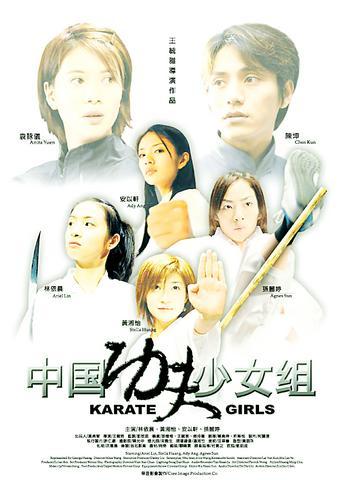Taiwan's film industry should start all over again, Hong Kong producer and president of the Federation of Hong Kong Film Workers Ng See-yuen (
The three-day conference was packed with local and international film professionals, as well as enthusiastic film students and movie fans. Together, they discussed the all-too familiar topic of how to save the Taiwanese film industry.
This time around, the country's young generation of filmmakers seemed to agree with Ng.

"Taiwan has too many film directors. But we don't have enough scriptwriters," said filmmaker Su Choa-pin (
It took Su and his team two years to write the text for Double Vision, all the while sending the script back and forth to various Hollywood producers and writers. It was the first Taiwanese movie made under the Hollywood working model, co-produced with Columbia Asia. "It was hard work, but very rewarding for me," said Su.
"In the past we always wrote our own scripts and made director's movies. But maybe it's time for a change," said Cheng Wen-tang (

Both Su and Cheng said this was a different approach to movie-making, a path distinct from predecessors such as Hou Hsiao-hsien (
As further proof of this theory, there are no Taiwanese films selected for the recently announced line-up at this year's Cannes Film Festival. South Korea and Thailand, however, are well represented. Two Korean films Hong San-soo's Woman is the Future of Man and Park Chan-wook's Old Boy have been selected for the competition section. A Thai film, Apichatpong Weerasethaku's Tropical Malady has been selected for the first time.
Hou Hsiao-Hsien has finished his latest work Coffee Time (
Discarding the tradition of looking at the world with a humanistic perspective, younger generation filmmakers are now moving toward a more innocent and less intellectual way of making films, concentrating on pure entertainment and marketable movies.
Formula 17 (
Fortunately for Yeh, the gay romantic comedy became one of the few local movies that made a profit in the past five years. The budget of the movie was just NT$4 million but it grossed NT$5 million at the box office, a small sales figure, but enough to make it the No.1 movie in terms of ticket sales this year.
This was a boost not only for Three Dots Entertainment, set up by a group of 30-somethings, but also for 23 year-old first-time director Chen Ying-jung (
Using pretty TV actors is another trend for the younger
generation of filmmakers. Alice Wang (
"My idea was to bring Taiwanese actors to mainland China and Hong Kong. A star is not born by appearing in just one film. You have to keep making movies to make them remembered by a wider audience," she said.
Wang's Karate Girls (
The film, co-produced with Bona Films in Beijing, was made with the Chinese market in mind. Thus, Wang was able to quickly raise funds for her next film, West Town Girls (
"For a long time, Taiwanese filmmakers have forgotten the basic social function of going to movies: that is to go to movies with your date, your family and friends," said Wold Chen (陳鴻元), CEO of Mata Entertainment. "Now, we are happy to see a younger generation going in a different direction," he said at the conference.

Dissident artist Ai Weiwei’s (艾未未) famous return to the People’s Republic of China (PRC) has been overshadowed by the astonishing news of the latest arrests of senior military figures for “corruption,” but it is an interesting piece of news in its own right, though more for what Ai does not understand than for what he does. Ai simply lacks the reflective understanding that the loneliness and isolation he imagines are “European” are simply the joys of life as an expat. That goes both ways: “I love Taiwan!” say many still wet-behind-the-ears expats here, not realizing what they love is being an

Google unveiled an artificial intelligence tool Wednesday that its scientists said would help unravel the mysteries of the human genome — and could one day lead to new treatments for diseases. The deep learning model AlphaGenome was hailed by outside researchers as a “breakthrough” that would let scientists study and even simulate the roots of difficult-to-treat genetic diseases. While the first complete map of the human genome in 2003 “gave us the book of life, reading it remained a challenge,” Pushmeet Kohli, vice president of research at Google DeepMind, told journalists. “We have the text,” he said, which is a sequence of

Every now and then, even hardcore hikers like to sleep in, leave the heavy gear at home and just enjoy a relaxed half-day stroll in the mountains: no cold, no steep uphills, no pressure to walk a certain distance in a day. In the winter, the mild climate and lower elevations of the forests in Taiwan’s far south offer a number of easy escapes like this. A prime example is the river above Mudan Reservoir (牡丹水庫): with shallow water, gentle current, abundant wildlife and a complete lack of tourists, this walk is accessible to nearly everyone but still feels quite remote.

It’s a bold filmmaking choice to have a countdown clock on the screen for most of your movie. In the best-case scenario for a movie like Mercy, in which a Los Angeles detective has to prove his innocence to an artificial intelligence judge within said time limit, it heightens the tension. Who hasn’t gotten sweaty palms in, say, a Mission: Impossible movie when the bomb is ticking down and Tom Cruise still hasn’t cleared the building? Why not just extend it for the duration? Perhaps in a better movie it might have worked. Sadly in Mercy, it’s an ever-present reminder of just